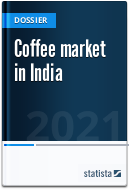India ranked seventh in the production of coffee, while Brazil dominated production and exports globally in 2018. Vietnam was the largest producer of the bean in Asia during the same time period. India stands seventh in export volumes worldwide and third in Asia after Vietnam and Indonesia. The country saw a drop in production and exports since 2017 due to torrential rains and flooding in its coffee-producing regions. Nonetheless, a majority of the coffee produced within the country is exported.
The coffee which remains is consumed primarily by south Indians who are known to have concocted what is called ‘Kaapi’- the regional phonetic interpretation of ‘coffee’. It is a blend of frothed and boiled milk with the decoction of finely brewed coffee powder in a traditional Indian filter made of out of two cylindrical metal cups. Outside the country, the Indian filter coffee is referred to as drip brew coffee.
Filter coffee became popular when Indian Coffee House – a café of the 1940s, run by the Coffee Board of India served it on their menu, thus becoming the drink of many Indians. There are about 400 chains of the Indian Coffee House across the country, following the first one in Jabalpur.
The dawn of the 21st century saw establishments like Café Coffee Day, Barista, Costa Coffee, and Starbucks among other major players of the coffeehouse market. Independent and regional outlets continue to emerge mainly in urban centers, resulting in a highly fragmented retail market.
Cafe Coffee Day, in contrast, seemed to dominate the retail coffeehouse market with increasing revenues in recent years and a brand presence across the country. Starting out as plantation owners in Chikmagaluru, the company expanded to setting up its first CCD outlet in 1996 in the center of Bangalore. Today, the franchise operates across six countries and employs close to 20 thousand people. The country is one of the fastest-growing markets for coffee chains, and Indian consumers have embraced the international coffee culture.












